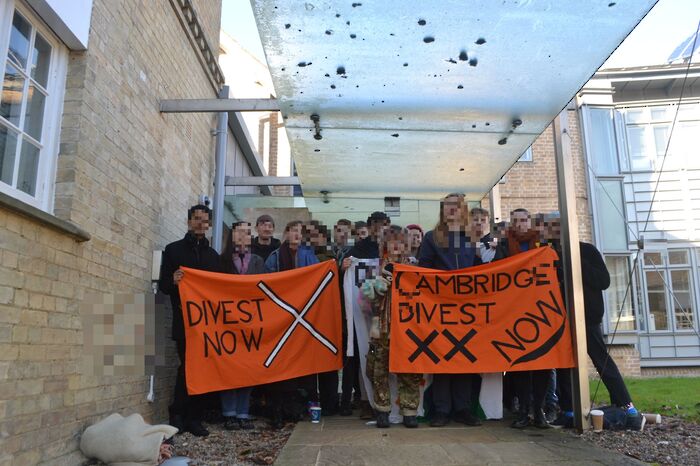Cambridge to evaluate divestment stance with new report
The report, which will consider the financial and moral consequences of divestment, is expected to be published or an update given in October

The University Council has committed to producing a report which will look “more deeply” into the advantages and disadvantages of divestment, with the report or a progress update to be delivered by 16th October 2019.
This follows the submission of an official motion signed by over 300 academics to Regent House, the University’s democratic governing body, on Friday 22nd March.
In accordance with the demands of the motion, officially called a Grace, the report will include “costed estimates of implementing a divestment policy initially and on its longer-term effects, both positive and negative, on the performance of the University’s investments.”
The Council’s response to the Grace notes that the report will be undertaken by the Environmental, Social, and Governance (ESG) Officer, a new position set out in the report published by the Divestment Working Group (DWG) last year. With the post currently unfilled, the Council notes that “part-time support has been agreed to enable work to commence in advance of a formal recruitment to the post.”
The report will “feed into the ESG Officer’s consideration of the impact and the financial, moral and reputational consequences” of divestment.
In producing this report, the Council has set out that the ESG Officer will likely collaborate with a number of bodies “in Cambridge and beyond”, and that input will be sought from members of Regent House and students.
These include the Carbon Neutral Future Initiative, the research centre to be established following the DWG report’s recommendation. Other bodies named include the Investment Office, which manages the University’s endowment, Cambridge Enterprise, Cambridge Innovation Capital and the Institutional Investors Group on Climate Change.
The Grace, spearheaded by Reverend Jeremy Caddick, dean of Emmanuel College and a member of the Faculty of Divinity, called for a report which would consider the political and social advantages and disadvantages of divestment. Further to this, it directed the Council to produce a report which would assess the “moral acceptability” of its investments in fossil fuels and the reputational impact of these investments.
It stated that the report produced by the DWG last year “did not refer to advantages or disadvantages of divestment,” as set out in a Grace of January 2017, “but asked for a broader consideration of the issues.”
Neither did the Council’s response, published in June last year, consider the advantages and disadvantages of divestment, the Grace continued.
In its response to the Grace, the Council notes that it “made clear at the outset that there would be a broad focus for the work of the DWG.”
“The Council note[s] that a previous group had already carried out detailed work on the University’s investment practices and indicated that it had therefore asked the DWG to consider the question of disinvestment from businesses involved in fossil fuel extraction more broadly. It also asked the DWG to consult widely across the collegiate University.”
Following the report provided by the DWG last year, the University Council made the controversial decision to reject full divestment, instead adopting a policy of ’considered divestment’, barring only direct investments in the most pollutive fossil fuels.
The DWG report came under intense scrutiny in January of this year when The Guardian revealed that two members of the group were involved in proposed donations to the University from fossil fuel giants.
In its response to the recent Grace, the Council “emphasise[d] that it wishes to receive an objective and independent assessment” of the issues surrounding divestment going forward with the report.
In a statement to Varsity, Cambridge Zero Carbon Society said that it “welcome[s] the University’s response to historic academic pressure to reconsider how it can divest from fossil fuels. It is crucial that the University produces a transparent, comprehensive report, free of conflicts of interest,” and that the University “address[es] the full range of issues on divestment and produce[s] costed strategies for how it can divest if it is to comply with the wishes of hundreds of academics.”
- Updated, 28th April 2019: This article was updated to include comment from Cambridge Zero Carbon Society
 Lifestyle / How to survive a visit from a home friend19 November 2024
Lifestyle / How to survive a visit from a home friend19 November 2024 Comment / Cambridge’s LinkedIn culture has changed the meaning of connection15 November 2024
Comment / Cambridge’s LinkedIn culture has changed the meaning of connection15 November 2024 Comment / Give humanities students a pathway to academia15 November 2024
Comment / Give humanities students a pathway to academia15 November 2024 Comment / Cambridge hasn’t been infantilised, it’s grown up15 November 2024
Comment / Cambridge hasn’t been infantilised, it’s grown up15 November 2024 Features / Vintage Varsity: the gowns they are a-going15 November 2024
Features / Vintage Varsity: the gowns they are a-going15 November 2024







